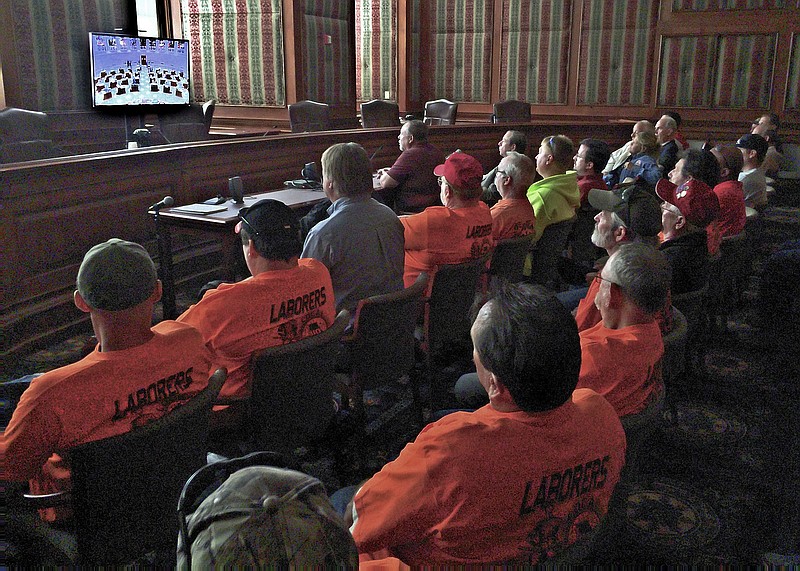With several hundred union members watching from the Senate gallery and on closed-circuit TV screens in a couple of hearing rooms, Missouri senators Tuesday evening halted an 8½-hour debate, then passed and sent back to the House a bill that would add Missouri to the list of 25 "right-to-work" states.
Right-to-work laws prohibit unions and their employers from agreeing to contracts that require all employees to pay union dues, even if they choose not to join the union.
Sen. Dan Brown, R-Rolla, sponsored the bill in the Senate, that the House passed Feb. 12 by a 91-64 margin.
"This is for the people of Missouri," Brown told reporters after the series of votes needed to pass the bill and send it back to the House, because of some wording changes senators made to the House bill.
"This is an economic development bill for all points of Missouri - I don't care what anyone says."
Gov. Jay Nixon has said he'd veto the measure and, based on the current vote totals, the House is 17 votes short of the number needed for an override, and the Senate's 21-13 vote is two shy of the two-thirds needed for an override.
The final vote came only after most of the Senate's Republicans used a parliamentary maneuver called the "previous question' that has been used only 27 times since 1970, to pass 11 bills.
Four of those bills required 12 PQ votes in 2007.
In the 34-member Senate, the motion has to be made in writing and signed by at least five members.
Brown said he decided to use the motion - and got more than a dozen senators' signatures on each of the PQ motions he needed to make - because Democrats "weren't, obviously, going to allow it go" to a vote.
Sen. Scott Sifton, D-Affton, said the GOP lawmakers used a "nuclear option."
"The previous question is a very seldom-used tactic - almost unheard of until the Republicans took the majority 15 years ago," Sifton told reporters.
"And the tactical response has always been that, if they are going to disrespect the manner in which this (Senate) is intended to operate by forcing (votes) and overcoming the privilege of senators' debate - we will use every procedural devise at our disposal to restore fairness and equity."
Sifton said the Senate may not pass any other bills this week, even though there still are three days remaining before the Constitution requires the session to end.
"We made it very clear that, if they were going to PQ right-to-work," Sifton explained, "as far as we were concerned, that was going to be the end of any policy discussion."
Brown said Democrats and Republicans must work together these last three days, to pass other important bills.
"I think that my colleagues on the other side of the aisle will see that we need to get the FRA (federal reimbursement allowance) tax done," he said. "There's $3.8 billion there that funds the Medicaid system.
"So, it's not to any of our advantages to blow up and go home, at this point."
Sifton countered: "They're the ones who exercised the nuclear option.
"And this is what happens when the majority party exercises tyranny over the minority. ... They just said no to the organizing rights of hundreds of thousands of Missourians, notwithstanding our objections."
In 1978, Missouri voters overwhelmingly rejected a proposal to become a right-to-work state - even though unions represented only about 15 percent of the total work force.
That number now has dropped to between 6 and 8.5 percent, depending on which numbers are used.
Brown said making the change still is important for economic development.
"This is a basic Republican platform nationally," Brown said. "I don't know how you're a Republican if you don't support right-to-work."
That was an easy call for Sen. Ryan Silvey, R-Kansas City, who noted during Tuesday's debate that his Clay County district "is heavily employed with union jobs. I have one employer (Ford Motor's Claycomo plant) with 7,400 union jobs."
Sen. Paul Wieland, R-Imperial, and Gary Romine, R-Farmington, also voted against the previous question motions and the bill.
Mid-Missouri Sens. Mike Kehoe, R-Jefferson City, Jeanie Riddle, R-Mokane, and Kurt Schaefer, R-Columbia, voted for the measure and the PQ motions.
Missouri Senate roll call on 'right-to-work' legislation
Compiled by The Associated Press
The 21-13 roll call vote Tuesday on a measure that would prohibit union contracts with employers that allow the collection of fees from non-members, sometimes called right to work.
Voting "yes" were 21 Republicans.
Voting "no" were nine Democrats and four Republicans.
REPUBLICANS VOTING YES
Dan Brown, Rolla
Mike Cunningham, Rogersville
Bob Dixon, Springfield
Ed Emery, Lamar
Dan Hegeman, Cosby
Mike Kehoe, Jefferson City
Will Kraus, Lee's Summit
Doug Libla, Poplar Bluff
Brian Munzlinger, Williamstown
Bob Onder, Lake St. Louis
Mike Parson, Bolivar
David Pearce, Warrensburg
Ron Richard, Joplin
Jeanie Riddle, Mokane
David Sater, Cassville
Rob Schaaf, St. Joseph
Kurt Schaefer, Columbia
Dave Schatz, Sullivan
Eric Schmitt, Glendale
Wayne Wallingford, Cape Girardeau
Jay Wasson, Nixa
DEMOCRATS VOTING NO
Maria Chappelle-Nadal, St. Louis
Kiki Curls, Kansas City
Jason Holsman, Kansas City
Joe Keaveny, St. Louis
Paul LeVota, Independence
Jamilah Nasheed, St. Louis
Jill Schupp, Creve Coeur
Scott Sifton, St. Louis
Gina Walsh, St. Louis
REPUBLICANS VOTING NO
Tom Dempsey, St. Charles
Gary Romine, Farmington
Ryan Silvey, Kansas City
Paul Wieland, Imperial

